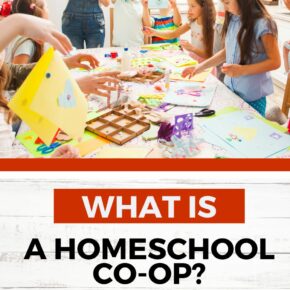Sometimes when we homeschool, we just wish we could have a group of people to do this homeschool journey with. Friends for us, friends for our kids, and a community learning experience for us all. One way that you can get this is through a homeschool co-op.

Simply put, a homeschool co-op is a group of adults (usually moms but could be moms and dads, grandparents, or anyone involved in your child’s education) who join with other home educators to create a learning time for the group’s children together.
There are so many ways that a homeschool co-op can work. Some homeschool co-ops meet weekly, biweekly, or monthly. Some focus on one subject- for example, nature study, art, or science. Some focus on using a particular program (check with that program on how to use it in a homeschool co-op, as there are often guidelines and may be additional fees). The co-op might be very large, with many classes to choose from at once for each age group. Or the co-op might be small, with all the children of many ages doing an activity or learning time together. Some co-ops might bring in outside help for the teaching part and some (usually) rely on parent volunteers to help teach.
You might find a homeschool co-op already made in your community that you can join. Ask around at local homeschool groups and see if there is anything offered.
Now that you’ve learned what a homeschool co-op is, how do you consider if you want to join one?
Should You Join a Homeschool Co-op?
Its always important to consider all the pros and cons when deciding any decision. Discover the benefits and drawbacks of joining a homeschool co-op:
Benefits
There are many benefits to being part of a homeschool co-op! Some of them include:
- Your children get to experience something different than the usual homeschool environment at home.
- They get to learn with other kids who aren’t their siblings.
- They will socialize with other kids and hopefully develop friendships with other homeschooling kids. Co-op could be an easier environment to make friends because you see the same kids every time.
- Your children will gain skills on how to manage group learning.
- Your children get to learn from different teachers and perhaps different topics than you might cover at home. If the teachers choose a subject they are passionate about, and you are not passionate about it, your children will gain knowledge in a new and exciting way.
- Kids generally love co-op because they get to be with other kids.
- Parents like co-ops because it takes some of the teaching pressure off and they might get a chance to socialize with other parents.
- When an event like co-op is scheduled into the calendar regularly, it’s already set and you don’t have to think about planning something.
- You will find support for your homeschool journey. Support is so important!
- Overall, co-op can be a very enjoyable part of your homeschool. However, it’s not perfect (nothing ever is!)
Drawbacks
Sometimes being part of a homeschool co-op can have drawbacks. Here are some things to consider when deciding whether or not a homeschool co-op is for you:
- One of the major parts about homeschool co-op that parents can find difficult is the need to help. You might find or decide to create a co-op where parents teaching is optional. When I ran a local co-op, parents were allowed to organize a special speaker or someone to come in and teach something for their turn if they didn’t want to or weren’t comfortable with teaching a large group. Not all co-ops allow this. Some co-ops allow moms to help in a nursery area instead of teaching. But of course, someone needs to do the teaching!
- Smaller co-ops might be a closer-knit group but tend to take more work. Helping at a co-op might not be something you want to commit to.
- Another thing to consider is that the co-op might not fit your beliefs or ideals or values. If you start your own co-op, you can make sure that it works for you. But if you join an existing co-op, this could be a problem.
- Another consideration is who is going to be part of the co-op. Are there children who are bullies to your children? Do you get along with all the parents? For a co-op to work, people need to get along and rules need to be in place for dealing with problems- they will happen!
- Sometimes co-ops can be on dates or times that don’t work well for your family. Perhaps considering one more thing to go out to and get out of the house for is just too much for you. You might already have a very busy schedule and your children’s social needs, your social needs, and other needs that co-ops can fill are already being met elsewhere. You don’t need to be part of a co-op to be a homeschool family! It’s entirely optional if it doesn’t work for you.
With all this to consider, keep in mind that as with anything you can join in life, there is no perfect homeschool co-op! You have to weigh the pros and cons and decide if it’s for you.
My biggest advice is to really consider if a homeschool co-op is for you in the current season you are in. This can change over time as your children grow and change. Is it best for you right now? Is it best for your children’s needs right now? If the answer is yes, then go looking for a co-op or start your own! If the answer is no, file away the idea for another time as seasons do change! Co-ops are a fun and engaging idea to add to our homeschool days and something I encourage homeschoolers to consider.
Are you looking for a local homeschool support group for connection to other homeschoolers? Check out our list of Canadian Homeschool Support Groups on Facebook.
- Engaging Ways to Learn About Canada’s Mammals - April 17, 2024
- Exciting Ideas for Studying Canadian Immigration in your Homeschool - March 17, 2024
- Canada’s Provincial and Territorial Birds: A Quick Guide for your Homeschool - February 16, 2024


